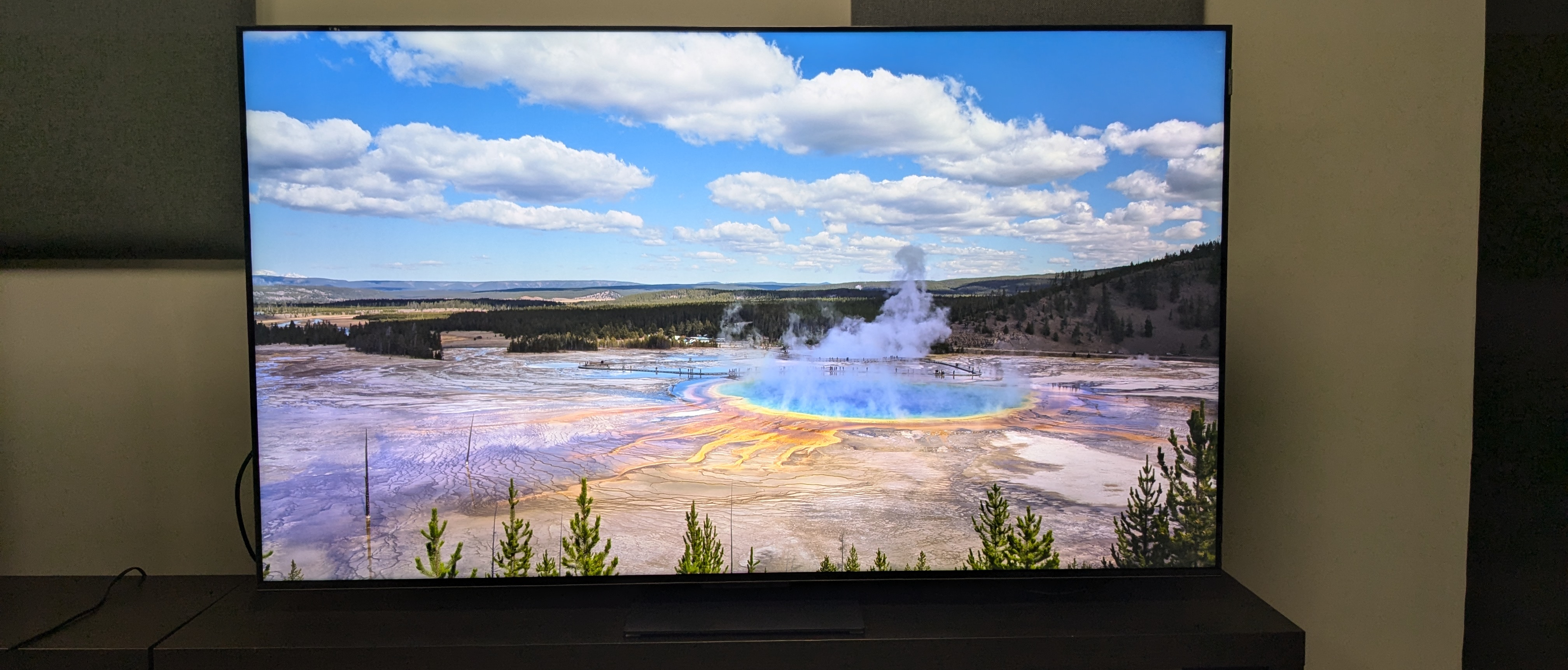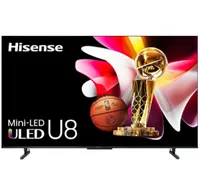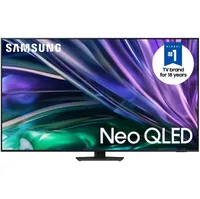TechRadar Verdict
The TCL C855 delivers a premium experience for the mid-range price it sits at, with picture quality that far exceeds its price range. It carries an extensive list of gaming features and its built-in sound is better than anticipated. The C855 ultimately doesn't beat the most premium TVs, but it does an impeccable job nonetheless.
Pros
- +
Stunning picture quality
- +
Near-full suite of gaming features
- +
Great value
Cons
- -
Some backlight blooming
- -
Limited viewing angles
- -
Two HDMI 2.1 ports
Why you can trust TechRadar
TCL C855 review: Two minute review
The TCL C855 stands out in an extremely competitive mid-priced mini-LED TV market by delivering excellent all-around performance for the price. It may not be the best in any category, but it asserts itself as one of the best TVs of 2024.
Picture quality on the TCL C855 is nothing short of impressive. Its black levels and contrast are rich out-of-the-box and it can rival the best OLED TVs with some adjustments within the picture settings. Colors are vibrant and dynamic, appearing both punchy and natural at the same time, and textures and details are refined and lifelike, coming close to the level of more premium sets like the Samsung S95D. There is some backlight blooming present due to the C855’s high brightness and motion settings require some adjustment, but overall this is one of the best mini-LED TVs in terms of picture at this price point.
The C855’s built-in sound isn’t going to blow away any of the best TVs for sound such as the Sony A80L or Panasonic MZ2000 by any means, but it delivers punchy bass, clear speech and great placement of sound effects around the screen. The C855 suffers from a limited soundstage, with all audio tied to the borders of the screen, but its direct sound is effective. You can add one of the best soundbars if you’re looking for an extra layer for movie viewing, but you may not feel the need.
For gamers, the C855 provides nearly everything you'd want, with 4K 144Hz, Dolby Vision gaming, VRR including AMD FreeSync Premium Pro and ALLM support. These features are limited to two HDMI 2.1 ports, unfortunately, but the C855 makes up for that with great gaming performance and graphics.
The C855 plays it safe with a straightforward and functional design. Its supplied central stand (on the 65-inch model I tested) feels sturdy and reassuringly well-built and its remote, while feeling on the cheaper side, is simple enough. It’s slightly thicker than some other models on the mini-LED market, but that’s to be expected when a TV houses a subwoofer.
While its Google TV smart TV platform is functional enough, albeit a little crowded on the home menu, it’s the C855’s plethora of picture and audio settings that stand out. There are tons of ways to customize and adjust the picture, letting you improve it to a level that far exceeds the TV’s price range.
The C855 is surrounded by competition including the Samsung QN85D, Hisense U7N and perhaps its closest rival, the Hisense U8N, but demonstrates excellent value. The price is more than fair for the quality and performance it delivers, with the 65-inch model I tested costing roughly £1,299 / AU$2,295. Cheaper mini-LED options such as the Hisense U6N exist, but the C855 really is worth the price.
Sign up for breaking news, reviews, opinion, top tech deals, and more.
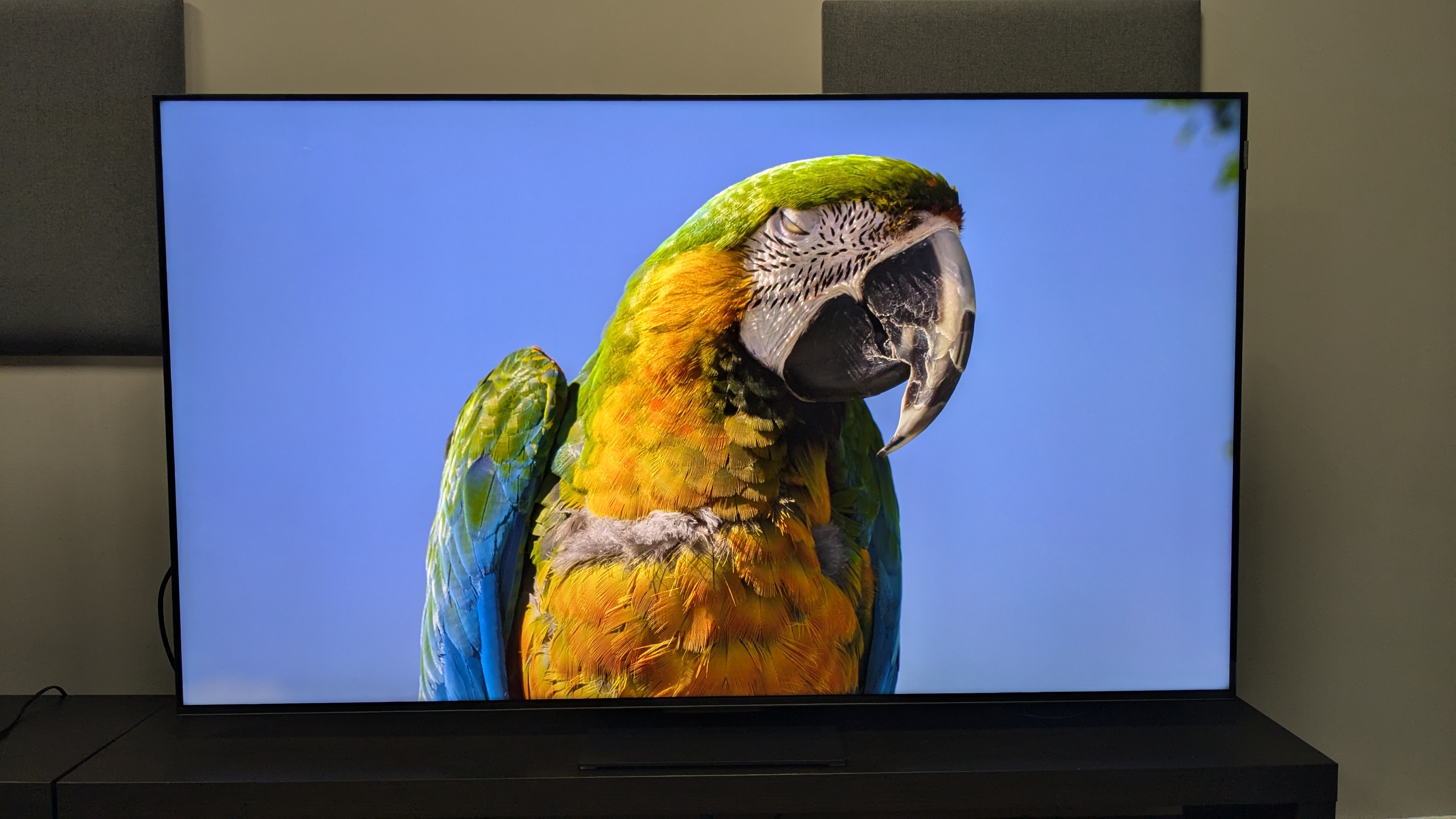
TCL C855 review: Prices & release date
- Release date: June 2024
- 65-inch price: £1,299 / AU$2,295
- 75-inch price: £1,699 / AU$2,895
- 85-inch price: £2,299 / AU$3,995
- 98-inch price: £3,999 / AU$7,995
The TCL C855 is one of the company’s flagship mini-LED TVs for 2024 in the UK and is available in 65, 75, 85 and 98-inch sizes. It only sits below the X955, which is limited to 85, 98 and 115-inch big screen sizes.
Priced at £1,299 / AU$2,295 for the 65-inch model I used for testing, it sits at the same price as the Hisense U6N in the UK (pricier than the AU$1,395 in Australia) but offers better performance, stronger picture quality and more gaming and smart features. Prices have remained largely unchanged since the C855’s release but for what it delivers, this is still a low price.
TCL C855 review: Specs
| Screen type: | QD mini-LED |
| Refresh rate: | 144Hz |
| HDR support: | Dolby Vision, HDR10+, HDR10, HLG |
| Audio support: | Dolby Atmos, DTS:X |
| Smart TV: | Google TV |
| HDMI ports: | 4 (2x HDMI 2.1) |
TCL C855 review: Benchmark results
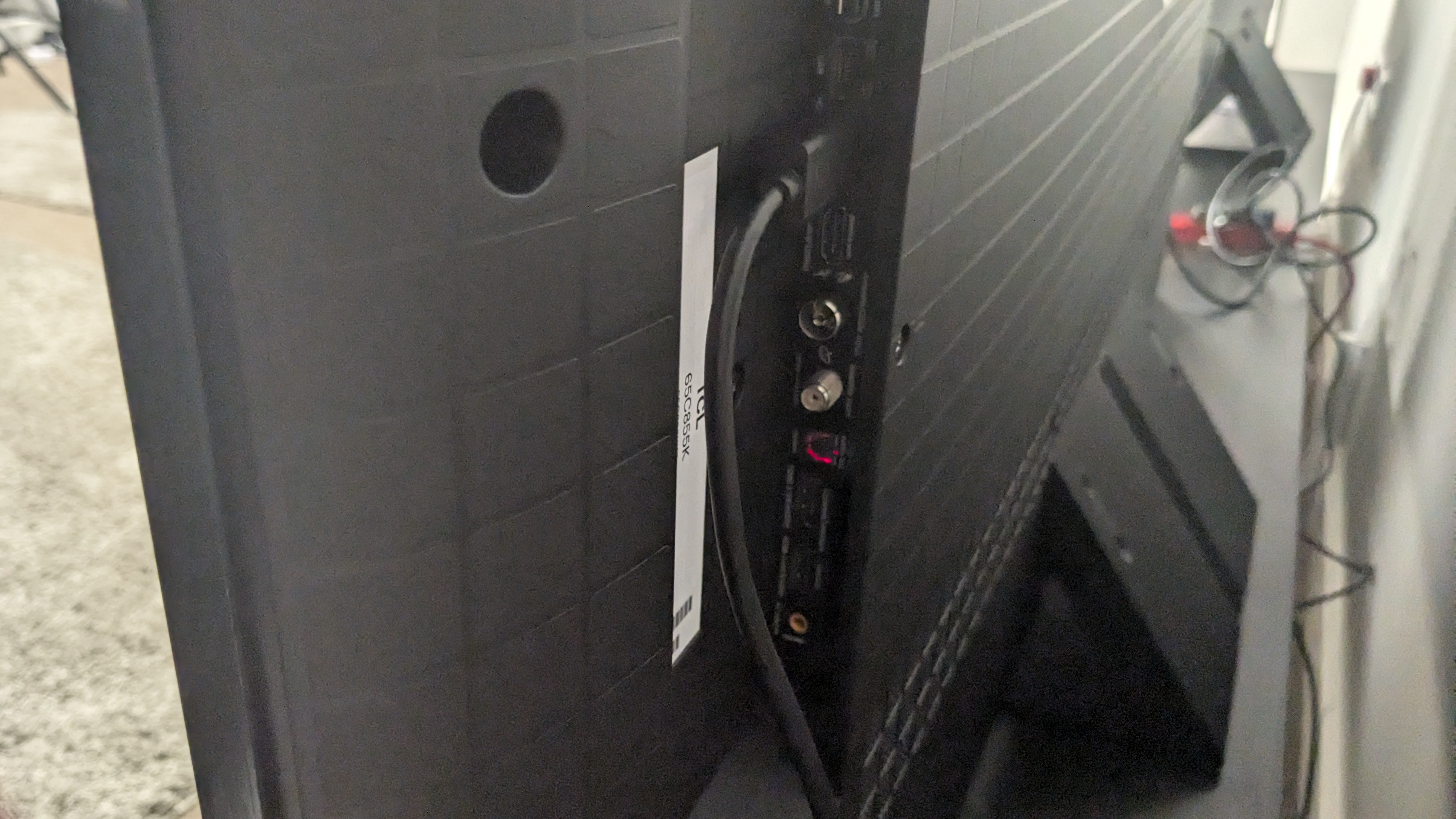
TCL C855 review: Features
- Bright QD mini-LED panel
- Dolby Vision and HDR10+ support
- Extensive gaming features
The C855 uses a mini-LED panel that delivers higher peak brightness than OLED, QLED and regular LED TVs. The 65-inch model features 1,344 local dimming zones and these increase to 2,160 zones for the 75 and 98-inch models and 2,304 for the 85-inch one.
HDR formats are well supported, with both Dolby Vison IQ and HDR10+ Adaptive featured. The C855 also supports IMAX Enhanced.
The C855 has an extensive suite of features for gaming, including 4K 120Hz (with support up to 144Hz for PC users) VRR (including AMD FreeSync Premium Pro), ALLM and Dolby Vision gaming. There is also a Game Bar for altering various settings during gameplay that displays frame rate and VRR information.
A 2.1.2-channel speaker array on the C855 is powered by 60W and has two up-firing speakers. The TV supports the Dolby Atmos, DTS:X and DTS-HD sound formats.
- Features score: 4.5/5
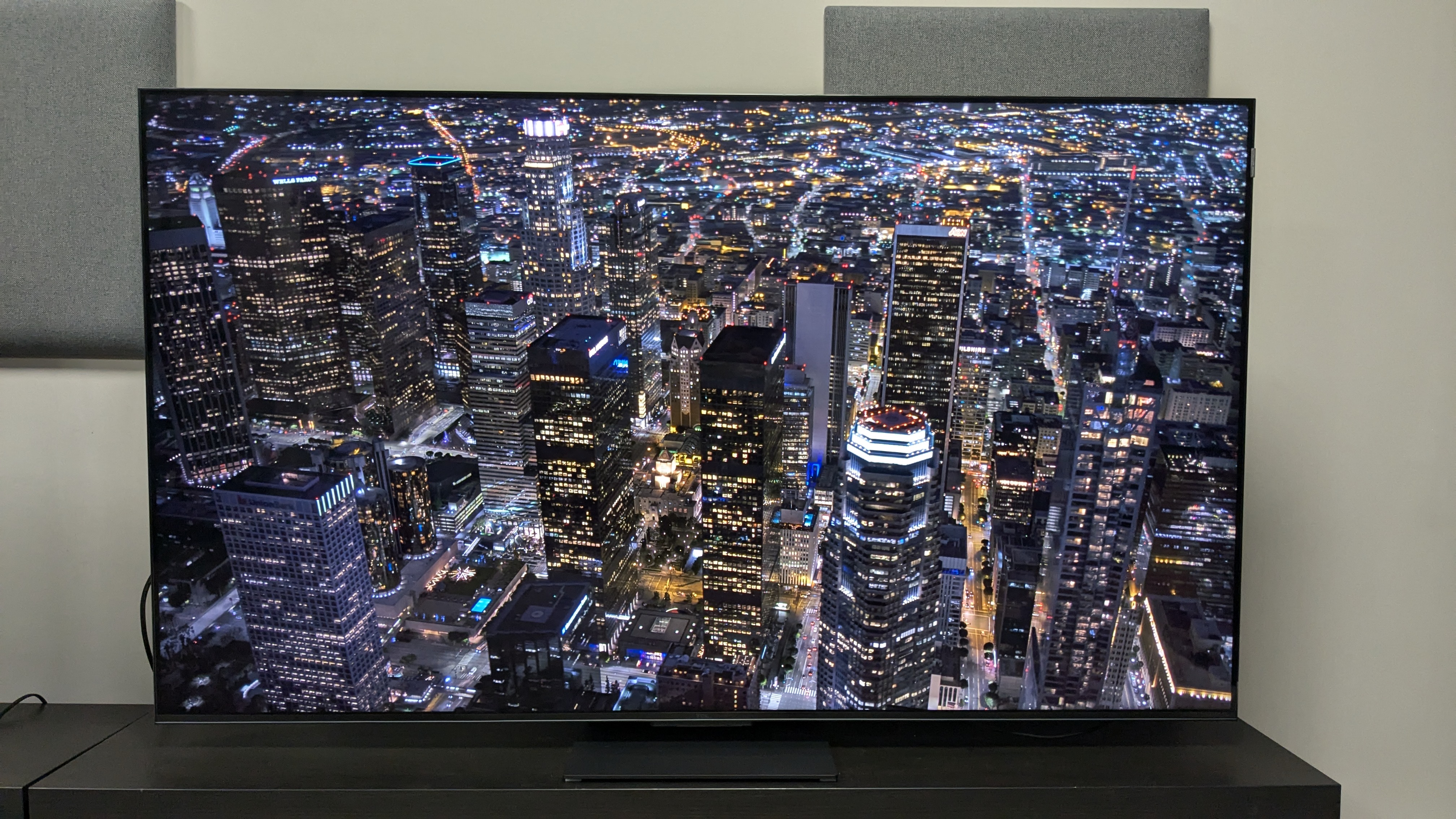
TCL C855 review: Picture quality
- Incredibly rich contrast and black levels
- Crisp textures
- Contrast fades in off center-viewing
Starting with brightness measurements, the TCL C855 showed excellent peak HDR brightness, hitting 2,919 nits and 1,891 nits in Standard and Movie mode respectively when measured on a 10% white window pattern. It also had high peak brightness when measured on a full-screen (100%) HDR white window pattern, yielding results of 832 and 825 nits in the same Standard and Movie modes. This makes it perfect for well-lit viewing environments and for daytime sport viewing.
The TCL C855's brightness results put it in direct competition with the Hisense U8N, which yielded HDR peak brightness results of 2,920 and 2,851 nits in Standard and Filmmaker Mode on the same 10% pattern. In the same modes, the U8N also hit 873 and 805 nits respectively for full-screen HDR peak brightness.
Moving onto real-world viewing, first starting with lower-resolution sources, the C855’s upscaling was pretty good overall, adding some extra sharpness to the usually fuzzy textures in standard-definition video, though it wasn’t as effective here as OLED TVs such as the Samsung S95D. HD content also benefited from upscaling and had a refined overall look.
Moving onto 4K HDR sources, I first started with a Dolby Vision stream of Star Wars: The Last Jedi to analyze color, focusing on the throne room fight. This scene was handled effectively by the C855, with the reds not only displaying a bold punchy look, but maintaining a natural quality. Lightsabers and flames also sparkled on screen thanks to the C855’s high brightness.
When measuring the C855’s HDR color gamut coverage, it yielded BT.2020 and UHDA-P3 results of 76.3% and 97.5% respectively, both of which are very impressive. The UHDA-P3 result actually beat the likes of premium mini-LEDs such as the Sony Bravia 9, so it’s no surprise colors looked so good on the C855.
Next up was a 4K Blu-ray of The Batman, a movie that often proves a challenge for TVs, especially mini-LED ones, due to its low mastered brightness (400 nits) and dark, grainy tone. I was pleasantly surprised at how well the C855 handled The Batman. Contrast was suitably rich, with a perfect balance of the few bright tones in the predominantly dark images. In the opening crime scene, the flashes of camera bulbs and high-hanging lamps cut clearly through the moody, dimly lit space. Shadow detail was also impeccable, giving black tones a real sense of depth and realism. Critically, no object detail was lost in the dimly lit scenes, with the characters’ clothing on full display instead of disappearing into the background.
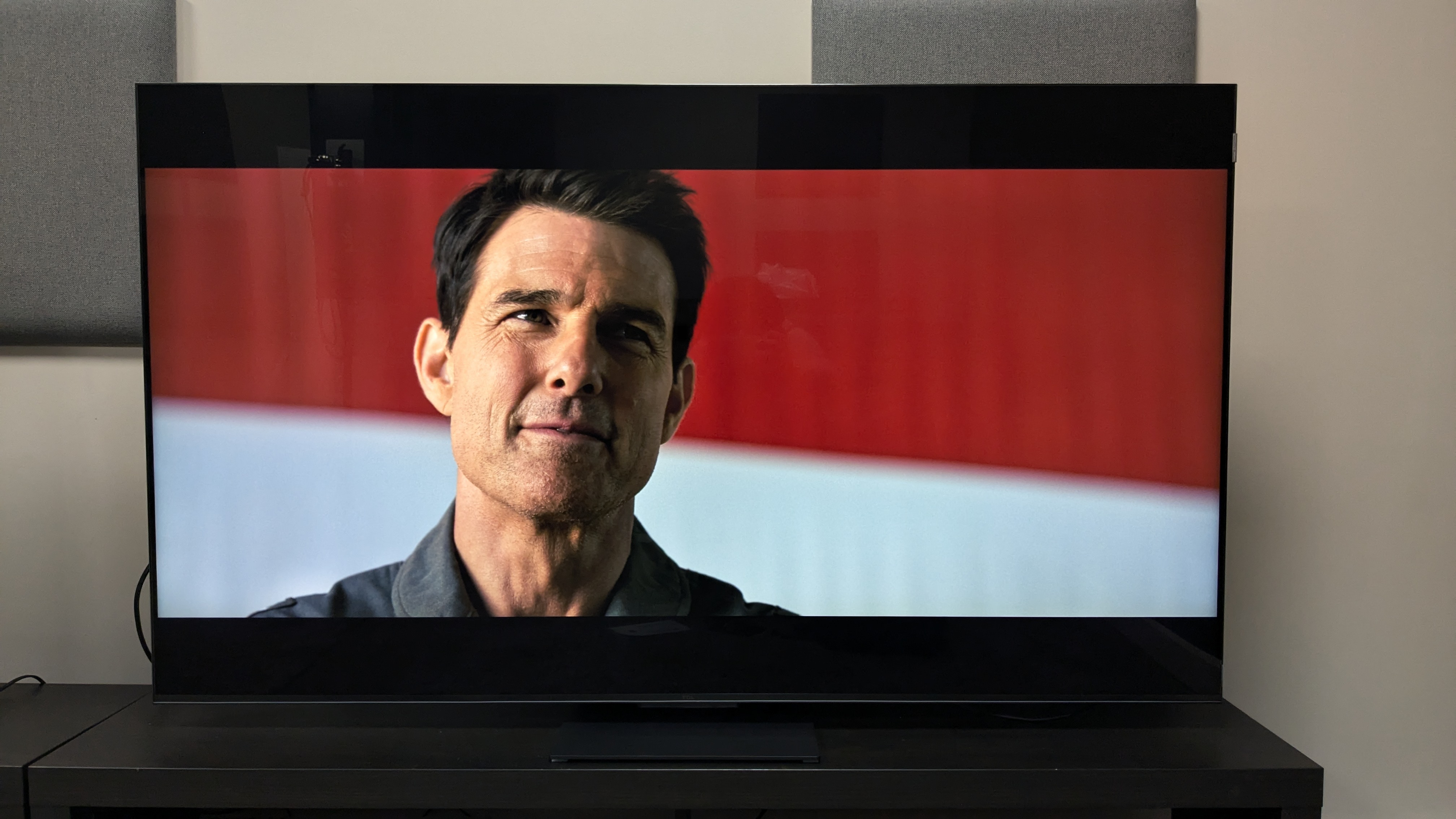
When measuring both the grayscale and color accuracy of the C855, it yielded results of 3.6 and 2.1 respectively. We typically look for these results to hit below 3, so while the C855’s grayscale wasn’t what we hope for, it’s in line with a lot of other high-brightness TVs such as the Samsung QN900D (which had a 5 average for grayscale) and the Hisense U8N (which averaged 3.7).
I found myself switching between two Dolby Vision picture modes throughout The Batman. Dolby Vision IQ provided more brightness, which was better for brighter lit environments and gave details better definition, but Dolby Vision Dark had a more natural look and black levels and shadow details were more realistic. Ultimately, both are effective, but I found myself more drawn to Dolby Vision Dark – especially for The Batman.
Detail on the C855 is also impressive, with textures and objects having a refined, crisp quality while maintaining a natural look. Watching Top Gun: Maverick, skin tones were true-to-life during close-up cockpit shots while weapons and vehicles and stitching on clothing looked well-defined.
The Spears & Munsil UHD Benchmark Blu-ray has a demo footage section that is perfect for analyzing all elements of a TV and watching it affirmed what I’d seen in my movie viewing. Black levels were deep and contrast was superb in an aerial shot of a city, with lit windows in buildings slicing through the night sky. Colors were vibrant and dynamic, and textures were lifelike, giving butterflies and reptiles a 3D-like realism.
Motion is also generally well-handled, but tweaking is required to get the look of some content just right. When watching an HD stream of a soccer game, the C855 benefited from blur and judder reduction settings (I placed mine at the mid-way point of 5) but once adjusted, the C855 did a good job with the free-flowing action and frequent camera pans. For movies, the C855 fared surprisingly well without motion setting adjustments, making light work of the panning shots of Mav riding his bike at full tilt and in the training missions in Top Gun: Maverick.
Despite its overall high-quality picture, the C855 is subject to backlight blooming. When viewed off-center, there were some obvious halo effects around objects, especially in scenes from movies and TV shows with jet-black backgrounds.
- Picture quality score: 4.5/5
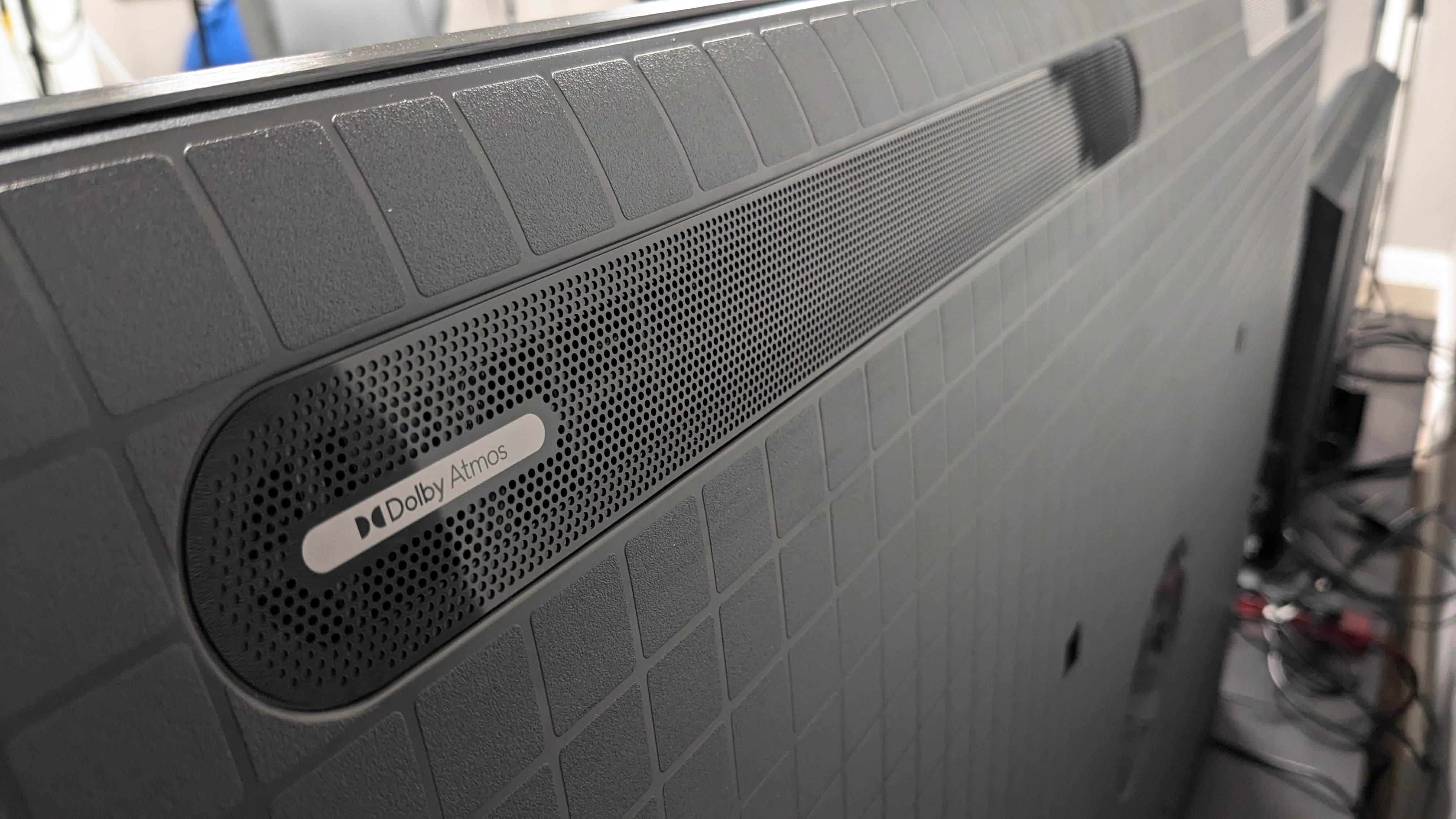
TCL C855 review: Sound quality
- Punchy, controlled bass
- Good sound placement around the screen
- Limited soundstage
The C855 has a 2.1.2 channel, 70W speaker array tuned by Onkyo that consists of a subwoofer, two up-firing speakers placed towards the top of the C855’s rear panel and two additional drivers. It supports Dolby Atmos, DTS:X and DTS-HD formats. While the C855 won’t rival the best TVs for sound, its built-in sound is still effective.
The C855’s bass carried plenty of heft and weight thanks to the built-in subwoofer. During the batmobile chase in The Batman, the rumble of the batmobile’s engine was room-filling and punchy, with crashes and explosions carrying a real sense of power. Dialogue was also clear, cutting through the chaotic batmobile car chase and the bright, sometimes brash, horn-heavy score of La La Land.
Sound is well-placed around the C855’s screen, with music and effects clearly connected to the action. Dolby Atmos effects were somewhat absent when watching movies initially, despite the C855’s up-firing speakers. This was rectified in the sound settings by changing the Surround Virtualizer to High (it was set to Medium by default), with the rain in The Batman becoming more apparent afterward.
I did find that the C855’s soundstage was somewhat limited and narrow, with all sound contained to the confines of the screen. It was generally pretty good overall, but I’d still recommend adding one of the best Dolby Atmos soundbars if you want the sound quality to match the C855’s picture.
- Sound quality score: 4/5
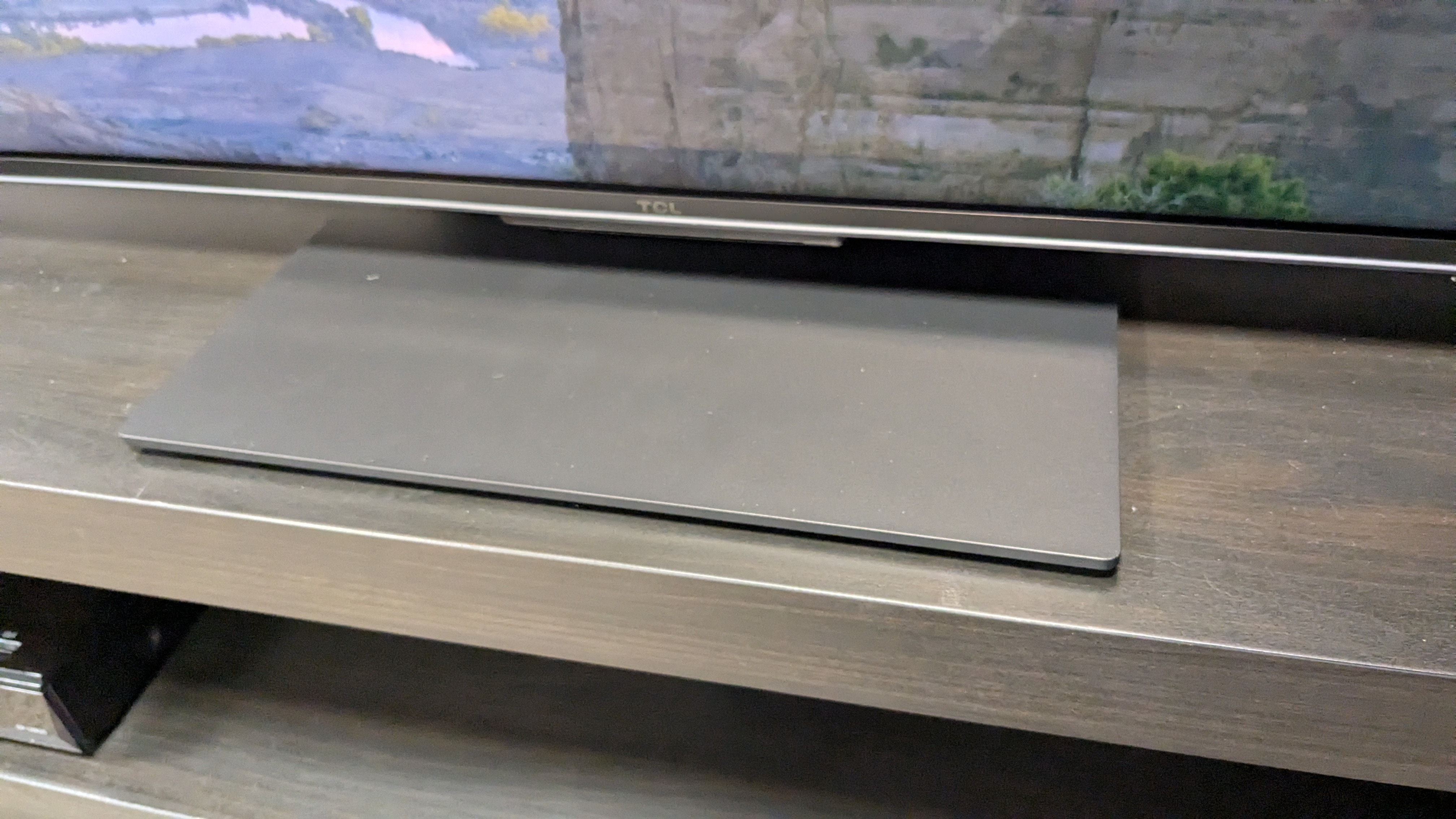
TCL C855 review: Design
- Sturdy, central stand
- Somewhat bulky
- Simple and functional
TCL opted for a simple, functional design for the C855. It doesn’t have the trim, modern appearance of premium OLED TVs like the Samsung S95D, but is still perfectly solid. The body itself is deeper than what you find on some sets, most likely to accommodate the up-firing speakers and subwoofer on the rear, but its screen has a neat, trim bezel allowing for maximum picture coverage.
The 65-inch model I tested has a metal stand that feels weighty and sturdy. Again, it won’t win any design awards, but does its job. The C855 is on the weightier side at 26.5kg with its stand attached – something to bear in mind during installation.
TCL’s supplied plastic remote feels a little cheap, especially compared to remotes from Hisense and Philips. It has a simple design and button layout, and It’s also worth noting the volume control has been moved from the front to the side.
- Design score: 4/5
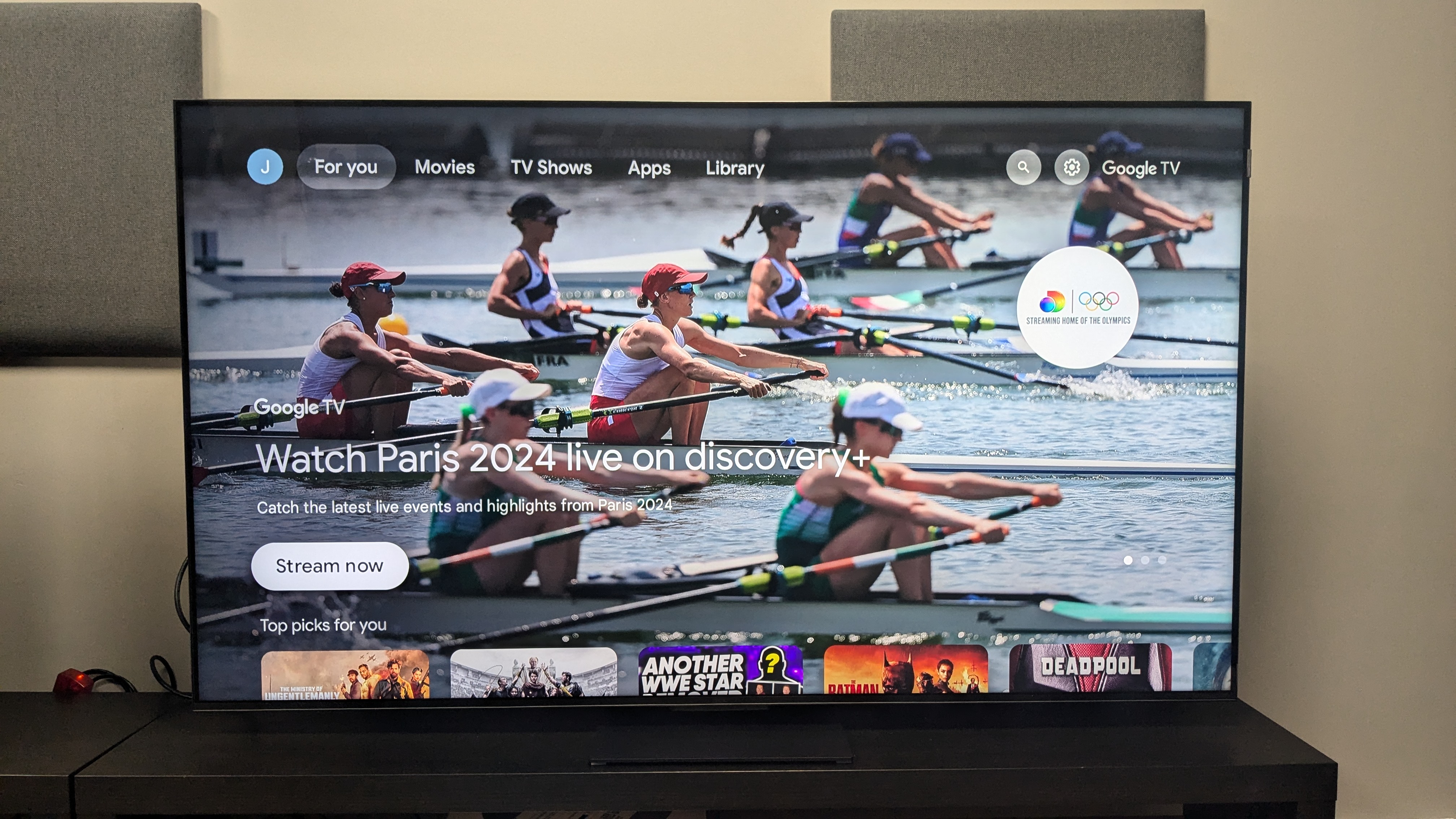
TCL C855 review: Smart TV & menus
- Google TV smart TV platform
- Banner ad takes up a lot of space
- Extensive settings for adjusting picture and sound
The C855 uses Google TV as its smart TV platform. The home page consists of recommendations tailored to your viewing history across different apps, labeled as ‘Top Picks For You’. A series of banner ads sit at the top of the home menu and take up a large amount of space, in some instances pushing down a row of apps below.
When selected, each app gets a colored halo to match its look – Netflix is red, Disney Plus is blue and so on. It’s a small but welcome feature as it’s an added visual aid and makes app navigation a little less tedious.
Menu organization and navigation are simple enough, and the depth of the C855’s settings is impressive. There’s plenty of opportunity here to tailor the picture to your liking. Settings are not quite as in-depth for sound, but there’s still more than on some other TVs.
- Smart TV and menus score: 4.5/5
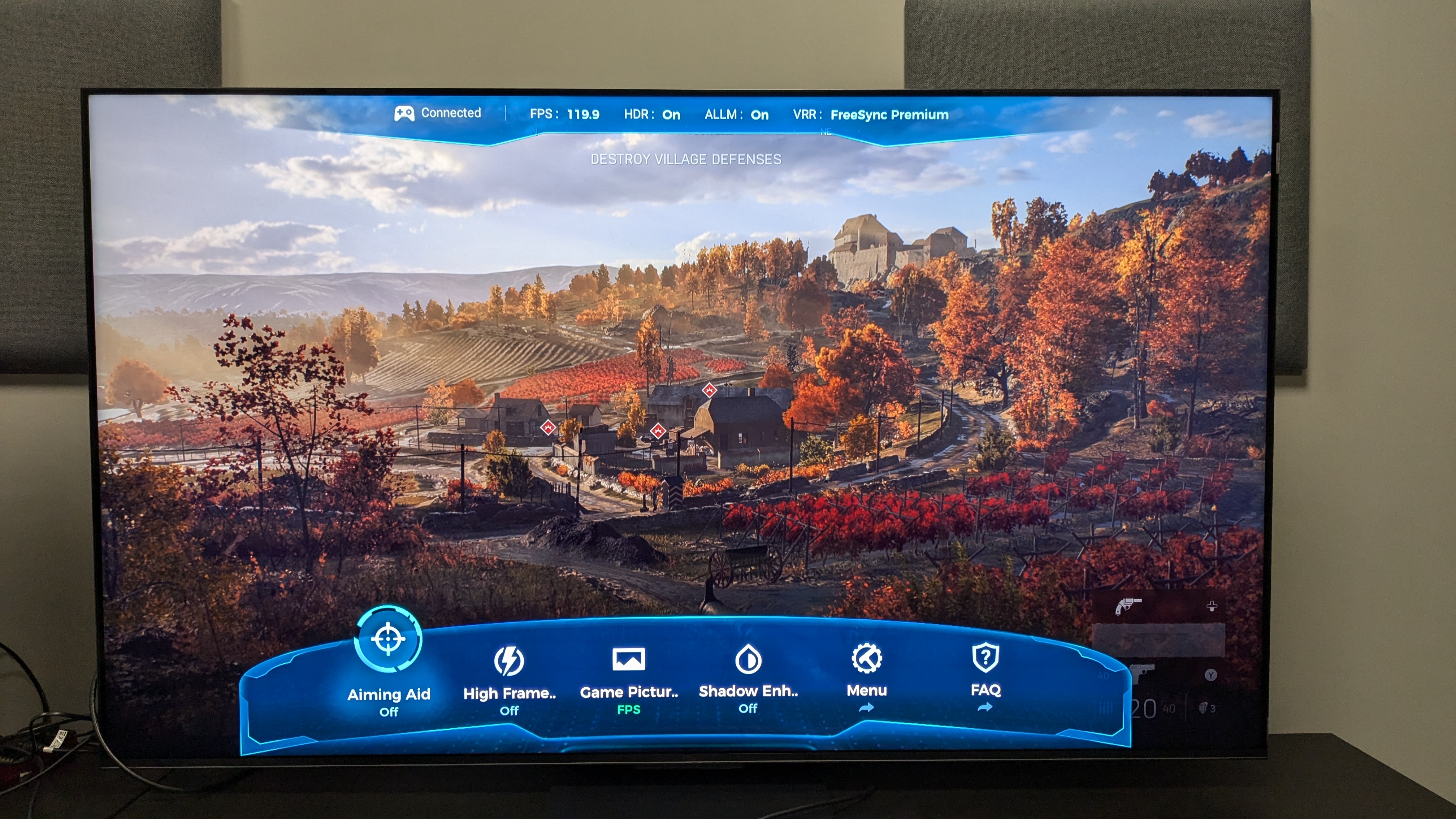
TCL C855 review: Gaming
- 4K 144Hz support
- Dolby Vision gaming
- 14.6ms input lag time
The C855 has a good stock of gaming features, including 4K 144Hz, VRR (including AMD Freesync Premium Pro), ALLM and Dolby Vision gaming. It also features an onscreen bar while in Game mode to adjust settings such as Shadow Enhancer and Virtual Aim. Like all non-LG and Samsung TVs, however, the C855 unfortunately has only two HDMI 2.1 ports.
Gaming performance on the C855 is smooth and controlled regardless of gaming genre. Playing Battlefield V on Xbox Series X, moving around and scanning the environment felt suitably intense. Regardless of how chaotic the sequence I played, the C855 made light work of it.
Measuring the C855’s input lag using a Leo Bodnar 4K HDMI input lag tester yielded a result of 14.6ms, which won’t beat the best gaming TVs but is still just below the 15ms input lag time threshold gamers generally look for.
Carrying across its picture quality from movies to games, the C855 displays excellent graphics, with plenty of detail, contrast and bold color adding to the gaming experience. Battlefield V looked particularly stunning in Dolby Vision mode, with one scene set in a woods during the fall showcasing the brilliant reds and yellows of the leaves.
- Gaming score: 4.5/5
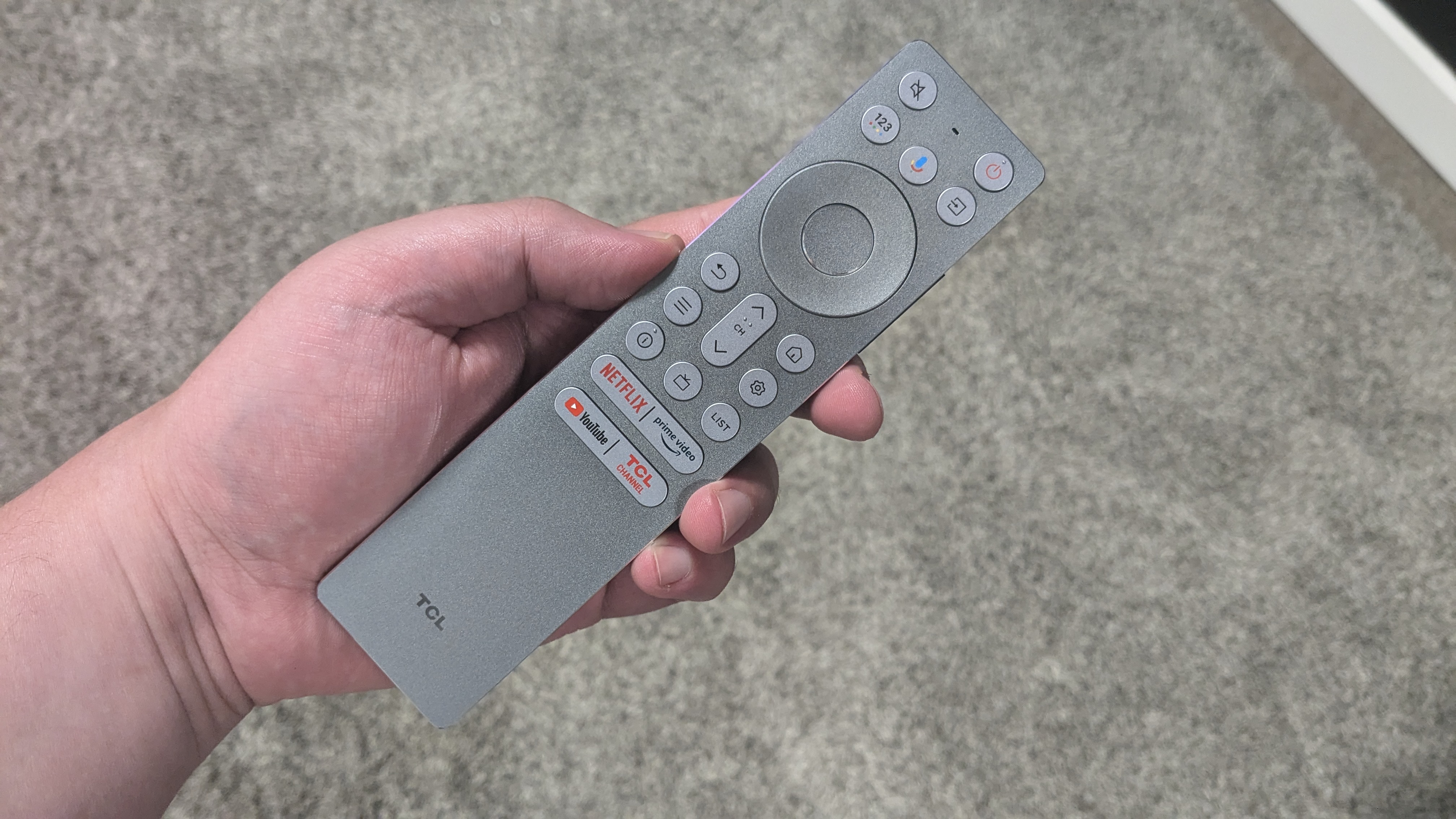
TCL C855 review: Value
- Excellent price for the picture and performance
- Rivals other mini-LED sets
- Stands out in a competitive market
With the 65-inch model I tested priced at £1,299 / AU$2,295, the C855 demonstrates exceptional value. Although still a pricey TV in general, the picture quality, features and performance the C855 delivers more than justify its cost. It’s similarly priced to the Hisense U6N, significantly cheaper than the Samsung QN85D (priced at £1,899 / AU$2,999 for the 65-inch model) while offering better performance than both in pretty much every category.
Compared with its closest rival, the Hisense U8N (which costs £1,599 / AU$2,699), the C855 still sits cheaper and while it may not be as effective for sports as the U8N, it carries similar picture quality for movies and the same set of gaming features for less.
The TCL C855 stands out from the crowd in an extremely competitive and arguably overcrowded mini-LED market, offering brilliant picture quality for a fair price.
- Value score: 5/5
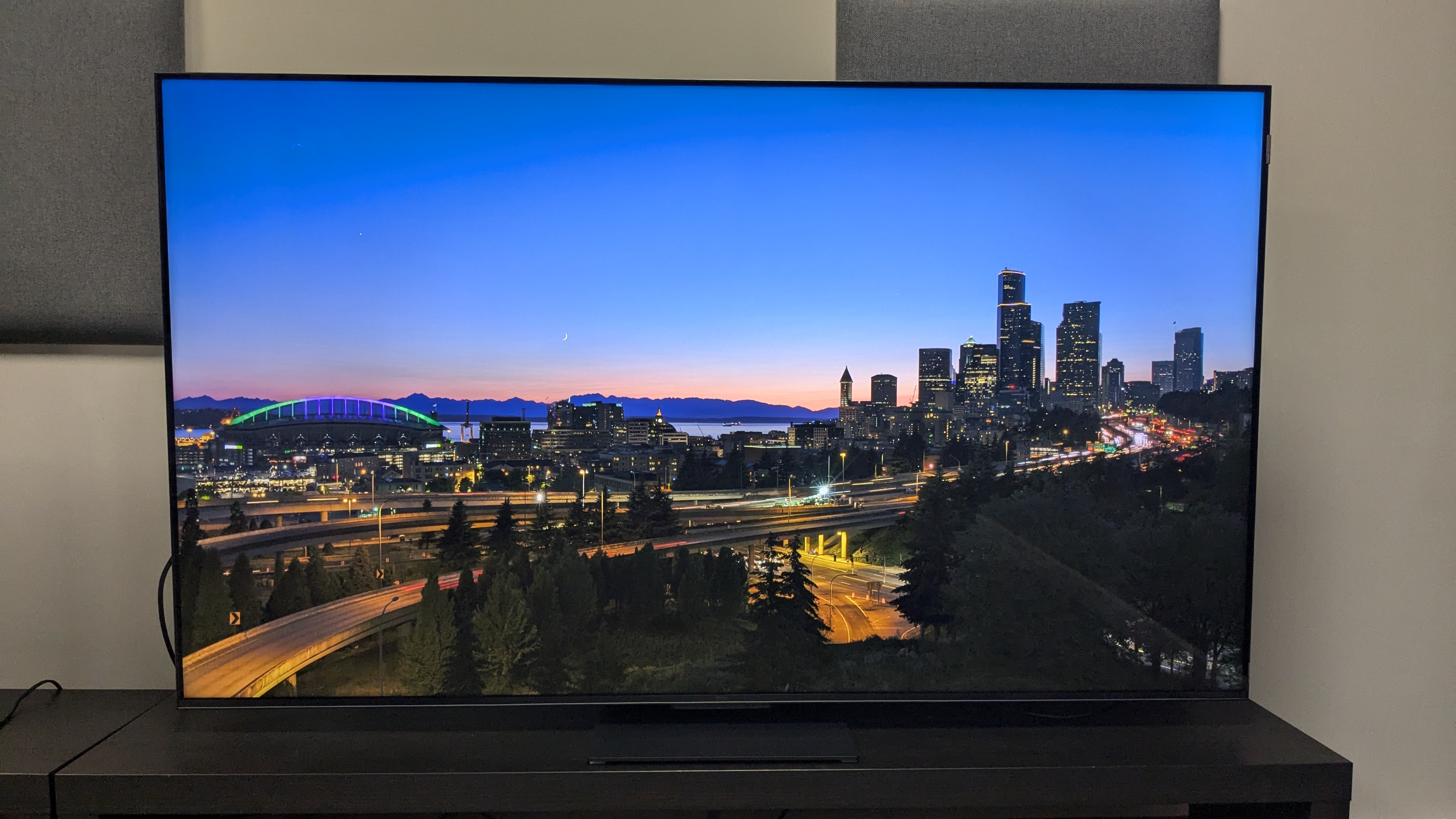
Should I buy the TCL C855?
| Attributes | Notes | Rating |
|---|---|---|
| Features | Good list of features for gaming, picture, sound and settings | 4.5/5 |
| Picture quality | Detailed picture with strong contrast and colour, but limited viewing angle | 4.5/5 |
| Sound quality | Punchy, controlled sound but limited soundstage | 4/5 |
| Design | Well-built but a little on the bulky side | 4/5 |
| Smart TV and menus | Google TV and plenty of settings to adjust for optimal picture | 4.5/5 |
| Gaming | Good suite of gaming features but only two HDMI 2.1 ports | 4.5/5 |
| Value | Exceptional value for the performance it delivers | 5/5 |
Buy it if...
You want a great picture for your money
The C855 proves that you don't need to spend a fortune to get an excellent picture, besting pretty much every other mini-LED in its price range.
You like to experiment with settings
The C855 has enough picture settings to tweak that you can truly get an outstanding image – one that even competes with OLED TVs.
You want a versatile TV
The C855 covers every base with a good spread of gaming features, brilliant picture quality, decent sound and an affordable (for this size) price.
Don't buy it if...
You want to watch in large groups
The C855's contrast fades and backlight blooming becomes much more prominent when viewed off-center.
You need multiple HDMI 2.1 ports
The C855 is limited to two HDMI 2.1 ports, meaning gamers with multiple consoles and a soundbar may have to explore other options or change connections every time.
You want an expansive sound
Although it's still good by TV sound standards, the C855's soundstage is narrow. A soundbar here will help enhance the viewing experience.
Also consider
| Header Cell - Column 0 | TCL C855 | Hisense U8N | Samsung QN85D |
|---|---|---|---|
| Price (65-inch) | £1,299 / AU$2,295 | $1,499.99 / £1,799 / AU$2,699 | $1,999 / £2,399 / AU$2,999 |
| Screen type | QLED with mini-LED | QLED with mini-LED | QLED with mini-LED |
| Refresh rate | Up to 144Hz | Up to 144Hz | 120Hz |
| HDR support | Dolby Vision/HDR10+/HDR10/HLG | Dolby Vision/HDR10+/HDR10/HLG | HDR10+/HDR10/HLG |
| Smart TV | Google TV | Google TV | Tizen |
| HDMI ports | 4 (2x HDMI 2.1) | 4 (2x HDMI 2.1) | 4 x HDMI 2.1 |
Hisense U8N
The TCL C855's closest rival, with both serving as the most widely available 'flagship' in their respective ranges. Both deliver excellent picture quality, are great for gaming and are well-priced at this size. However, the C855 is cheaper and uses Google TV, a better smart TV platform than the VIDAA one Hisense uses in the UK and Australia.
Read our full Hisense U8N review
Samsung QN85D
The Samsung QN85D features more HDMI 2.1 ports and has more natural-looking images, but doesn't beat the TCL C855 in any other category, especially value. It's still a good TV in its own right, but the QN85D should be reserved for Samsung fans.
Read our full Samsung QN85D review
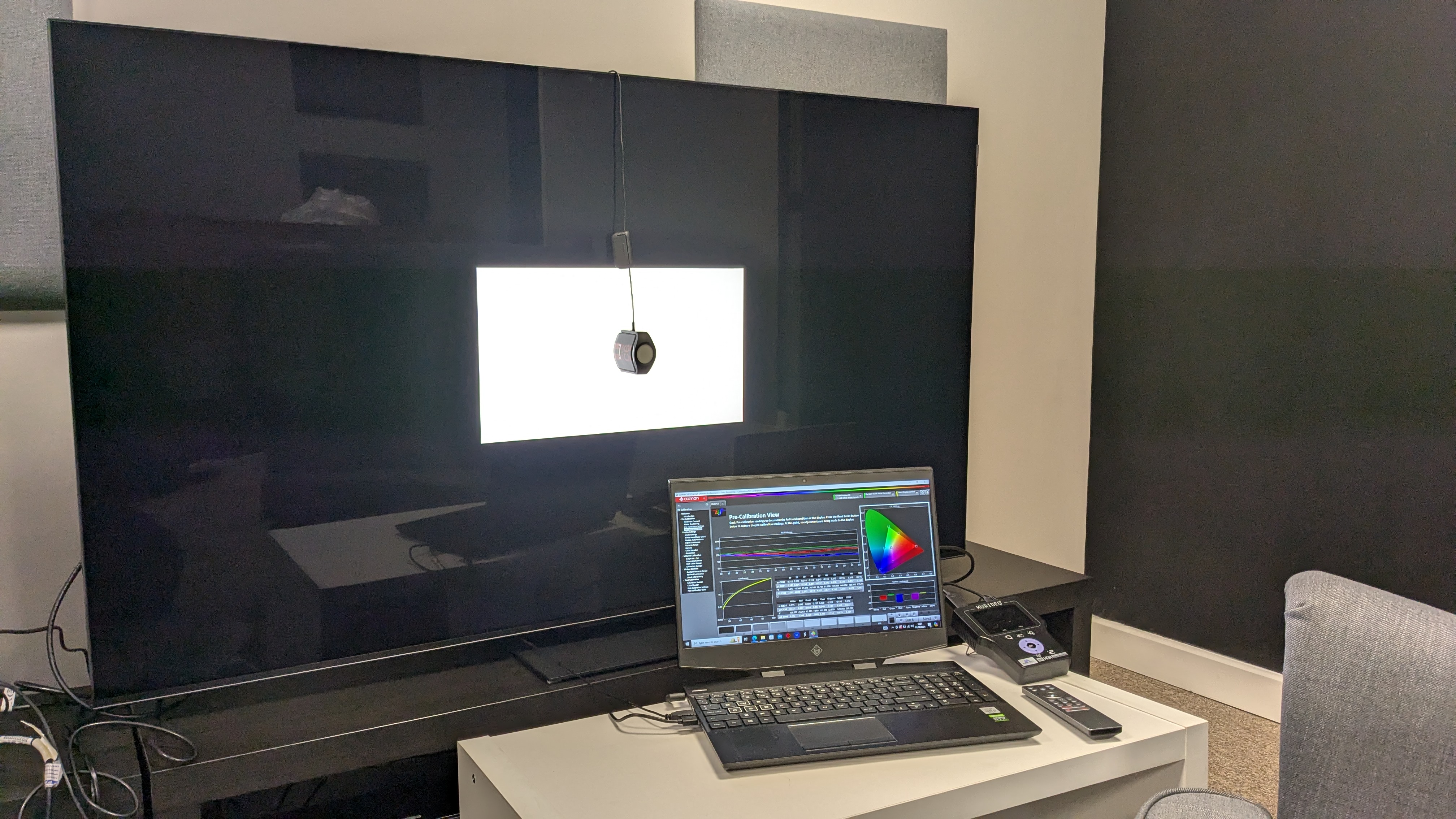
How I tested the TCL C855
- Tested in room with varying lighting conditions
- Both SDR and HDR sources used for subjective testing
- Measurements taken using specialized equipment
After some initial casual viewing of the TCL C855, I established its best picture modes for different forms of content, with Filmmaker Mode serving as the main choice.
After this, I moved on to more critical viewing, using a range of sources to analyse the C855's picture and sound performance and judging it for color, detail, black levels, contrast, and motion. I used several reference scenes from movies on 4K Blu-ray and streaming that I am familiar with. All discs were played on a Panasonic DP-UB820 4K Blu-ray player. I also analyzed the C855's gaming performance while playing on an Xbox Series X.
Next, I made objective measurements of the C855 using a test pattern generator and colorimeter, focusing on SDR and HDR brightness, grayscale accuracy and HDR color gamut coverage. Results were recorded using Portrait Displays' Calman calibration software.
You can read an in-depth overview of how we test TVs at TechRadar for more information about our process.
- First reviewed: August 2024
- Read TechRadar's reviews guarantee

James is the TV Hardware Staff Writer at TechRadar. Before joining the team, he worked at a major UK based AV retailer selling TV and audio equipment, where he was either telling customers the difference between OLED and QLED or being wowed by watching a PS5 run on the LG 65G2. When not writing about the latest TV tech, James can be found gaming, reading, watching rugby or coming up with another idea for a novel.
